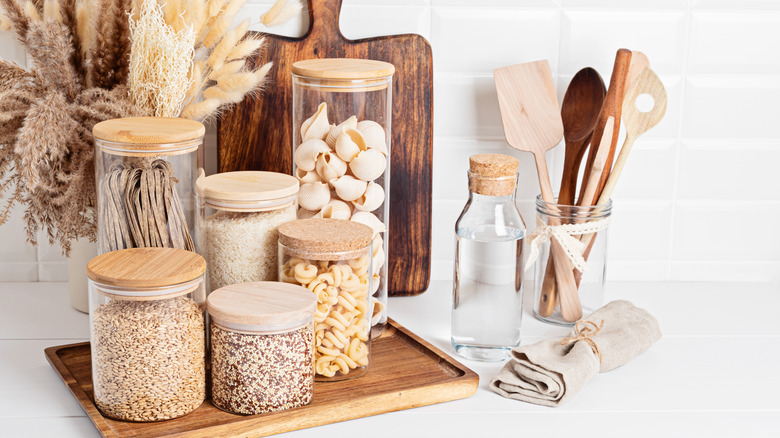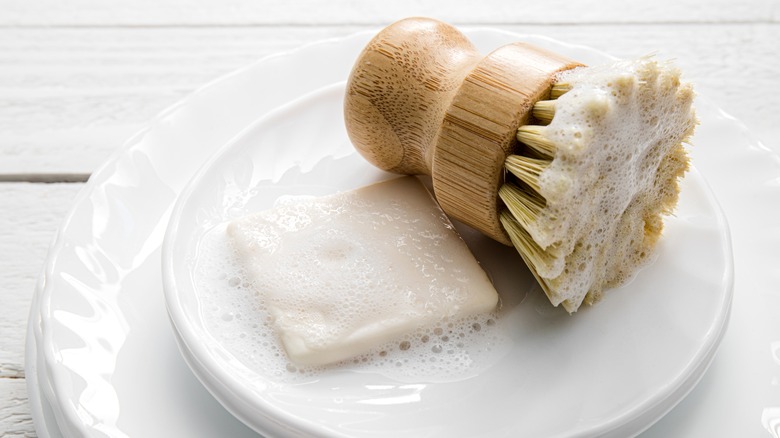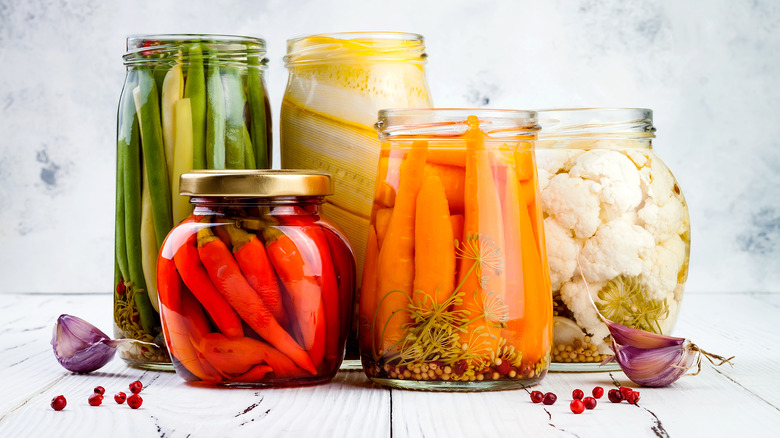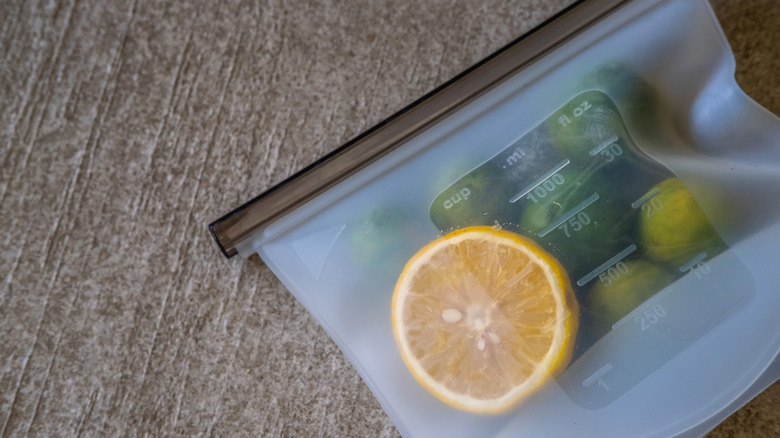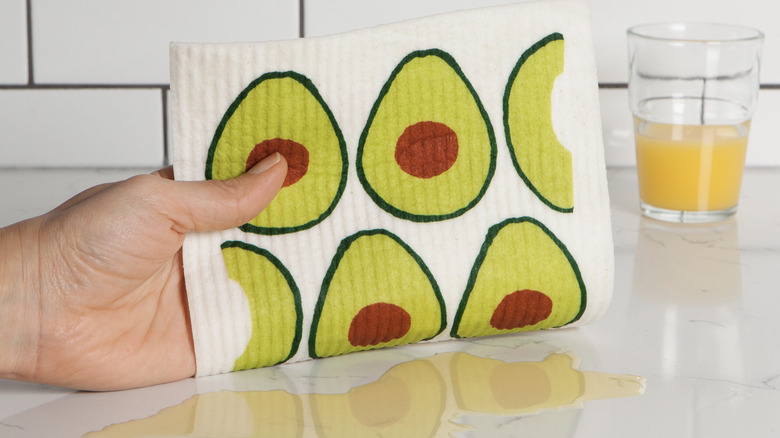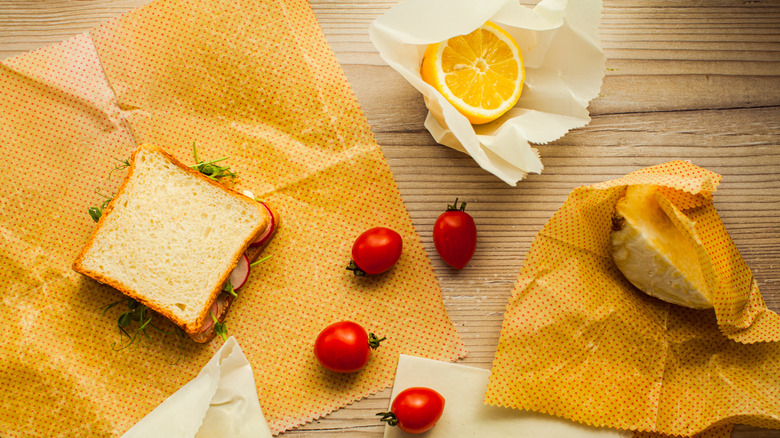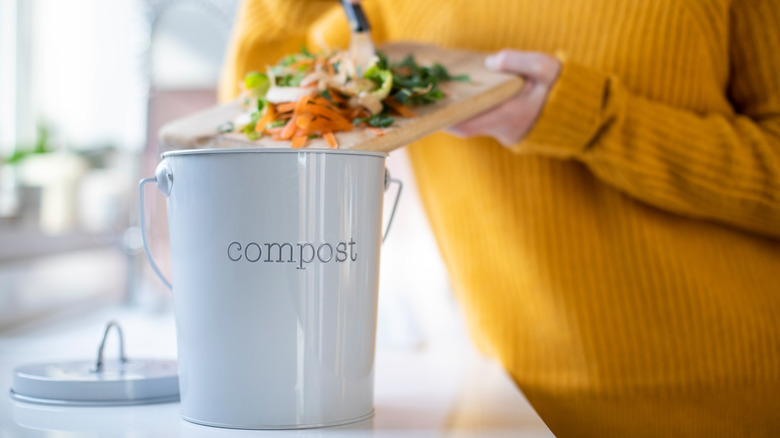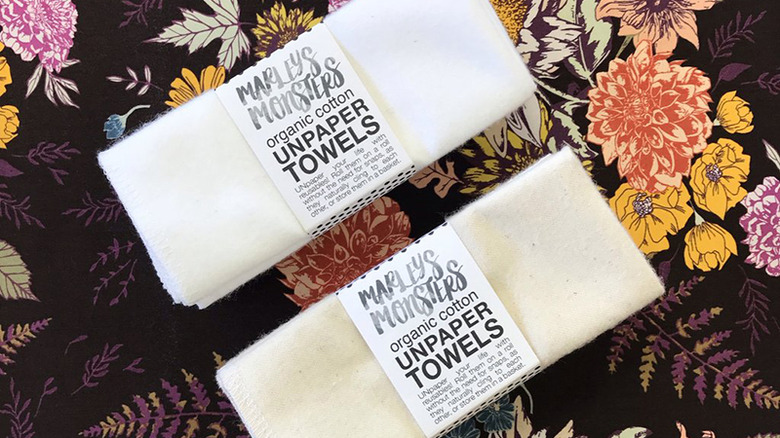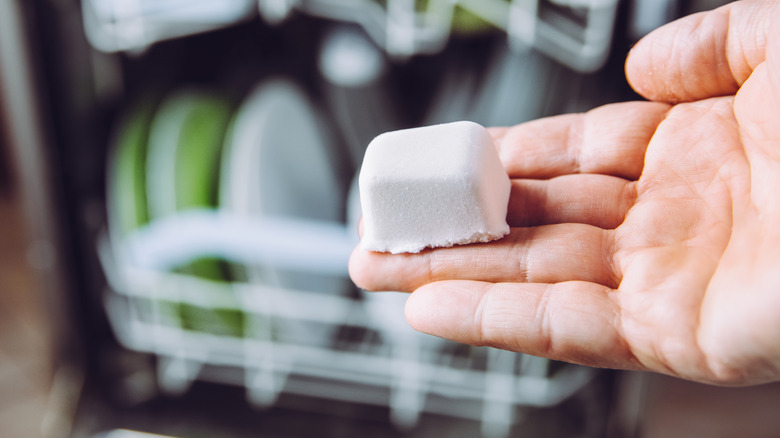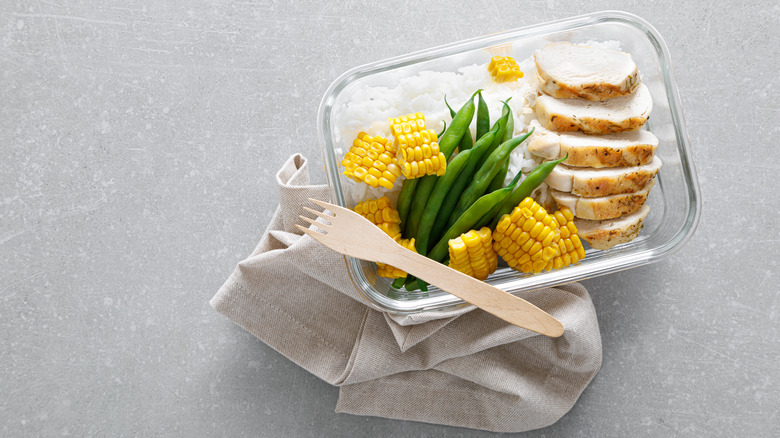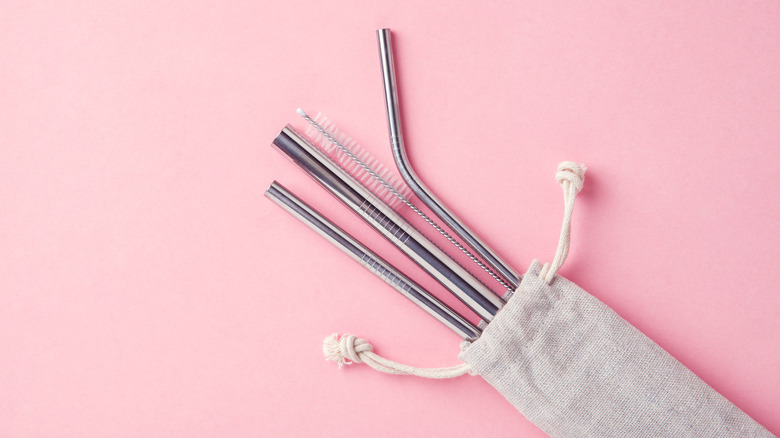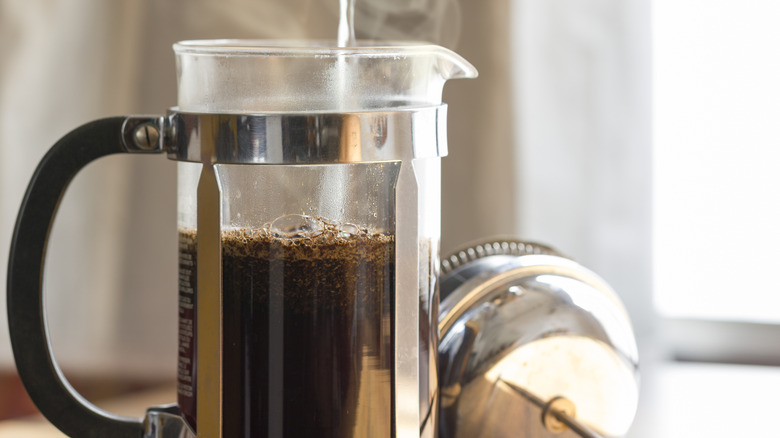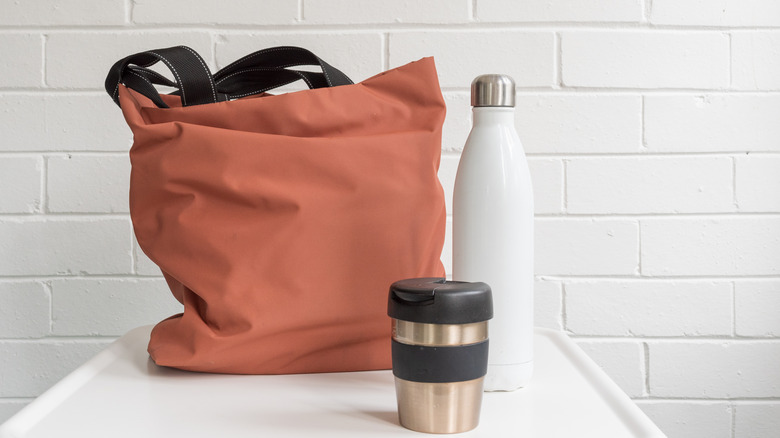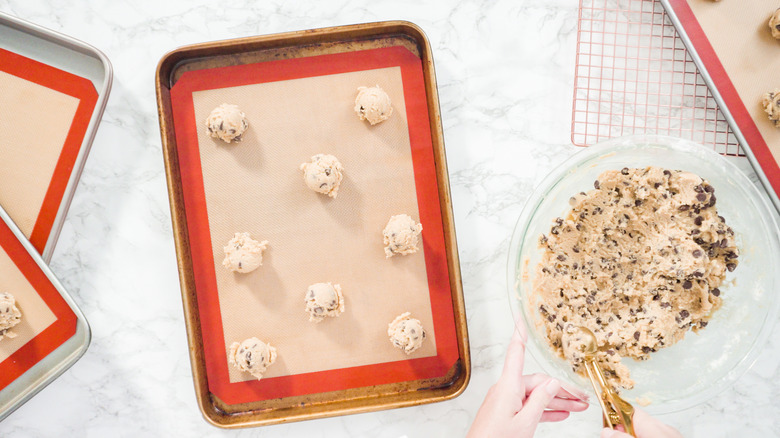The Best Eco-Friendly Kitchen Products You Should Own
We may receive a commission on purchases made from links.
Over the last few years, there have been more and more eco-friendly and sustainable products available to the everyday consumer. With plastic pollution increasing, current and new companies are looking to find alternative ways to limit plastic waste by selling better products not just for the planet, but for you as well. Popular trends you may see on social media include minimalism, zero waste, and simplicity. These are more than trends. They're lifestyles that can not only improve your well-being but help increase the longevity of our planet.
It may feel impossible to shift entirely to eco-friendly or zero waste, but the truth is you don't have to commit 100%. Even if you adjust a few minor things, that's enough to get the ball rolling. And as The Washington Post reported, there are simple steps you can do to get started. You can start buying in bulk, switch to reusable bags, and plan to swap out certain products in your home for eco-friendly ones. Here are some of the best kitchen products you should own for a sustainable home.
Invest in a bamboo dish brush
How many times do you find yourself replacing your dish sponge or washing rags because they begin to smell? Chances are, it's a lot. While it doesn't seem like a big deal because sponges are fairly cheap and come with several in a pack, the material they're made of takes years to break down. And the bacteria that are trapped in them can leak out into the ground while they're slowly decomposing. A bamboo dish brush is a great product to switch to the next time your sponge is no longer of use.
Bamboo has quickly risen in the ranks as one of the best eco-friendly alternatives to plastic. According to EarthHero, bamboo is extremely adaptable and resilient. Many people will say it takes over their yard if they attempt to grow it. It's toxin-free, which means products made from it are too. Dish brushes with bamboo handles will last far longer than their sponge or cloth counterparts. The bristles — sometimes also made from bamboo — repel bacteria and are easier to keep clean. When the brush is at the end of its life, you can toss it in your compost bin once you have a replacement. You can find a ton of bamboo dish brushes on EarthHero.
Save your mason jars
Within the sustainable and zero-waste lifestyle, there is one hard and fast rule everyone should live by. Use what you have. While replacing plastic with more eco-friendly products like bamboo, cloth, and steel is good, it's more important first to see what you already have that could work. Mason jars are an amazing resource many people already have in their homes. Because they're glass, mason jars are microwave and oven safe and BPA-free.
The Lean Green Bean writes that mason jars can be used for just about anything because of their variety, in both shape and size. You can store leftovers in them, sprout greens, create salads in a jar, display flowers, and drink from them. Those uses barely graze the surface. And the best part about them? You can repurpose them over and over. Glass is super easy to clean and reuse. So the next time you empty a pickle jar or finish a glass jar of jam, clean it out and use it for something else — no need to go out and buy some. Use what you have, and you'll be surprised by how many you end up with.
Swap plastic for silicone reusable bags
Silicone is a great alternative to plastic. It can withstand very hot and very cold temperatures and is non-toxic. One of the most popular eco-friendly products on the market today is reusable bags made from silicone that can replace the plastic bags you use. What makes them super attractive is their versatility and ease of use. If something leaks or gets in the bag, all you have to do is rinse it out or put it in your dishwasher. They come out good as new. Silicone is also oven and freezer safe, making it one of the best products you should have in your kitchen.
But silicone bags don't only have to be used in the kitchen. According to EarthHero, there are many more ways you can get use out of them. Yes, food storage will most likely be how you'll use them, but they also make amazing travel pouches. Keep liquids in them while flying to avoid messy spills. Fill them with snacks for the go, keep electric cords in them, or use them at the grocery store for produce. Silicone is also 100% recyclable, so when you need to replace your bags, you can toss the old ones in the bin, knowing they'll be turned into something else.
Upgrade to reusable Swedish dishcloths
We mentioned how dish sponges and rags could smell quickly after a single use. This is because we use them for more than just washing dishes. You might use them to clean up spills made while preparing meals or clean your kitchen counters at the end of the day. All of that adds more and more bacteria that are often the root of the stench. But you can say goodbye to smelly dishcloths by replacing them with Swedish dishcloths. This item comes in a variety of fun patterns, and they clean just as well as their sponge counterparts.
As Serious Eats explains, Swedish dishcloths are a cross between a paper towel and a sponge. The best of both is in one reusable and eco-friendly product. Made from a blend of cotton and cellulose, they're absorbent, dry quickly, and super durable. They are best used for cleaning wet spills and can be used for general cleaning. The goal of this product is to reduce paper towel waste, and many who have made the swap can attest to buying fewer rolls. After a few uses, you can clean them by adding them to the next dishwasher cycle.
Switch to reusable food wrappers
Once you switch to reusable silicone bags, reusable food wrappers will be the next eco-friendly product you'll want to test run. While aluminum foil is recyclable, there are a lot of steps you have to take to make it so, and plastic wrap adds to more plastic waste. It also sticks and becomes difficult to handle. That's where reusable food wrappers come into play. Using them is simple enough: You wrap the food inside or cover a bowl with it and press down. The heat from your hands helps the wrapper stick to whatever you're molding it against. When you're done storing food with it, you can rinse the wrap with some water and soap and reuse it for something else. Just make sure you let it completely dry before using it again, or else it may not stick as well.
According to Cook's Illustrated, there are a few things you want to check for when testing reusable food wrappers. Cling is the most important as a wrapper with poor cling won't preserve your food. You also want to ensure you're cleaning them properly so they don't hold any odors or stains that could limit their versatility. Like many food storage products, these wrappers will lose their adhesiveness over time. But instead of throwing them in the trash, you can cut them into strips and compost them.
Invest in a countertop composter
Composting has never been easier now that many companies and manufacturers have begun making them specifically for counter space. Not everyone can create a compost bin outside, so these indoor products are a great alternative to throwing food away. Some popular countertop composters include Lomi from Pela, Full Circle from The Container Store, and the Minky HomeCare Food Caddy from Amazon. One reason many people still hesitate to compost is that they don't know what they can compost. They're aware of the benefits, such as less trash and money saved on store-bought fertilizer.
But the fear of putting the wrong thing inside keeps them from buying. Thankfully, Planet Natural offers a free guide on what you can compost and what you can't. If you're also nervous about it smelling too much, add a slice of lemon or two inside to deodorize it (via EarthHero). You can also store your composter in the freezer during the summer months to eliminate any unwanted stench. Composting is certainly a learning curve, but once you get the hang of it, it'll be a product you'll want to encourage others to try.
Reusable paper towels and napkins are a must
Earlier, we talked about Swedish dishcloths and how they're great alternatives to sponges and paper towels, but it's normal to want to hang on to a few rolls of paper towels while you get the hang of these eco-friendly products. When you do, you can look into completely replacing your paper towels and paper napkins with cloth options. Paper towels and napkins are two of the biggest wasted kitchen items. But making the transition to cloth takes time. Like many other sustainable products, people are skeptical of their ability to do as much as a paper towel can.
And while paper towels don't have a huge carbon footprint, they amass over time, so checking out alternative options can be worth it. Bamboo paper towels are one of the most popular replacements in this category. Grove Collaborative writes that the main problem with paper towels is that the fibers are too short to recycle whereas bamboo paper is biodegradable and compostable. Still, if you want to go fully sustainable, using a cloth or reusable paper towels is your better bet, but it can take some getting used to.
Use dishwasher pods
When it comes to plastic recycling, the larger the plastic, the easier it is to recycle. That's why many people buy in bulk. They also save money by purchasing the largest-sized item on the shelf. Something like dishwasher detergent is an example of this. You're tempted to buy the biggest option because it'll last longer. But larger also means heavier and more space is needed to store it. If you've been meaning to look for something more eco-friendly that gets your dishes just as clean, check out dishwasher pods.
According to Going Zero Waste, cleaning companies in the United States aren't legally required to reveal the ingredients they use in their products. One major aspect of the sustainable lifestyle is not just limiting plastic waste, it's also using safe and non-toxic cleaning products in your home. That's why doing some research is always a good idea before buying the first "eco-friendly" pods you see. Many in the sustainable space love Dropps, Blueland, and CleanCut. The great thing about these pods is that they're toxic-free and take up far less space than liquid detergent.
Use glass storage containers
We mentioned how mason jars are some of the best for food storage and keeping things organized. Glass, in general, is always a better option than plastic since it's BPA-free and doesn't leak microplastics into your food while reheating. That's why when it comes to larger food storage, glass containers are perfect to add to your growing eco-friendly kitchen product list. Not only are they toxic-free, but they're dishwasher, oven, and microwave safe.
Some other benefits of using glass storage containers, according to Wild Minimalist, are their durability and their aesthetically pleasing look. IKEA has a particularly beautiful and affordable set with bamboo lids. Having a bunch of glass storage containers will also encourage you to save leftovers more, which means lunch for the upcoming days. You can also bring smaller sizes when grocery shopping or eating out and use those to save leftovers instead of the plastic containers the restaurant might give you.
Say yes to reusable straws
This is perhaps the easiest and fastest item to replace in your kitchen if you want to live more sustainably. It's common knowledge at this point that plastic straws are one of the worst items polluting our planet. And so buying an eco-friendly option is a great way to offset that. There are so many different types of reusable straws on the market today that it can actually be overwhelming when shopping for a set. You can choose between stainless steel, glass, silicone, and bamboo.
Each of those options is far better than plastic, but you may prefer one over the other. EarthHero understands this dilemma and says that when picking reusable straws, it's best to know what you will use them for. For example, silicone and bamboo are best for kids because they're lighter and more flexible. Glass and steel are better for smoothies and water. In the end, you might have a few different kinds, which is fine. But how do you avoid using plastic straws while on the go? Keep a spare reusable straw in your glove compartment or your purse. They take up very little room and are quick to clean. You can also turn down a straw when offered and instead drink right from the cup.
Make coffee in a French press
People love convenience, and why shouldn't they? When things are easier to do and complete, it makes life run a tad bit smoother. But many conveniences come at the cost of cutting corners and creating more waste. How so? Single-use coffee pods are a great example of this. These machines made making coffee quick and easy. No more waiting for the water to boil and the coffee to brew. You can have a cup in less than three minutes. But those coffee pods create a lot of waste and are difficult to recycle.
If you're looking for a more eco-friendly coffee option that will give you that boost of caffeine when needed, look into buying a French press. According to Lifehack, the French press makes some of the best-tasting coffee because it allows time for steeping, enhancing the grounds' natural flavor. In terms of sustainability, a French press works because there's no filter or pod. You pour everything into the same cylinder, and you can then compost the leftover coffee grounds. While there are eco-friendly coffee filter products, a French press is still the best alternative. The extra time is worth the flavor.
Look for reusable cups and mugs
Many people take their coffee, tea, and water on the go. And to ensure they stay hot or cold, they invested in reusable cups and mugs. Like reusable straws, these eco-friendly products are a dime a dozen. You can find just about any type of reusable travel cup, from stainless steel to silicone and even glass. The one type you want to avoid is plastic. While you can and will reuse a plastic water bottle over and over again, you still run the risk of it not being properly recycled at the end of its lifespan.
Going Zero Waste mentions that each material has its pros and cons. Stainless steel is the most durable, but it can dent easily. Glass bottles are infinitely recyclable but are super fragile. And silicone is best for both types of liquids but doesn't always hold its shape. Finally, reusable plastic water bottles are the most affordable but don't last as long. Your best bet is to look for a durable one, which will save you money from buying replacement after replacement. It's also important to note that you don't need a cabinet full of reusable travel cups. One for your coffee and one for your water is enough. You can also look into Hitch, which created a product that does both.
Try out silicone baking sheets
When it comes to meal prep and cooking, there's no way around it — you're going to make a mess. It doesn't matter if you're the cleanest person in the world; cooking is bound to get a little chaotic. You want to make sure that when you're preparing meals for yourself and your family, you want to make them in non-toxic pots and pans. Like plastic, certain cookware materials can withhold bacteria that seep into your food while cooking it. That's why bringing non-toxic cookware into your home is vital, whether you want to be eco-friendly or not.
As for your bakeware, a great alternative is silicone baking sheets. We mentioned before how amazing silicone is. Besides being able to withstand extreme hot and cold temperatures, it's 100% recyclable and easy to keep clean and maintain. NBC News reports that silicone baking sheets aren't just for baking. You can use them in place of aluminum foil, a cutting board, and a pot cover. Other bonuses are that they're microwave, dishwasher, and freezer safe. Finally, due to the material's flexibility, you can roll them up and store them in a space-saving bin.
